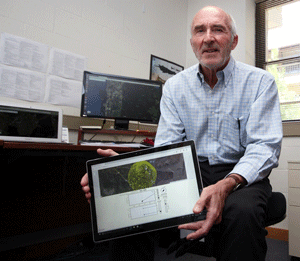Bushfire predictions at the fingertips of fire fighters

Researchers at The University of Western Australia are developing a new touchscreen device that can be mounted in a fire truck to help firefighters predict where and when a bushfire will spread.
The researchers are modifying bushfire simulation software Australis into a high-end tablet to provide accurate predictions of fire behaviour more rapidly than current methods.
Professor George Milne from UWA’s School of Computer Science and Software Engineering said the technology could protect lives, homes, crops and livestock in Western Australia’s bushfire prone areas.
“Having the Australis fire prediction technology in the cab of a fire truck or a farmer’s ute will enable first-responders to get the best information necessary to create appropriate firefighting and evacuation strategies,” Professor Milne said.
“This can happen in the very early stages of a bushfire, when time-critical responses are required.”
Professor Milne said the touchscreen device would complement the Aurora system used by the Department of Fire and Emergency Services (DFES) which currently runs the simulator from one central location for all fires in WA.
“On a day where there are several bushfires across the state, it may take too long to predict each individual fire’s progress using a single system in the central headquarters,” Professor Milne said.
“The advantage to local brigades with access to this technology is that it will give them location-specific information about which communities are at risk and which need to be evacuated.”
The Australis system analyses data including geographical topography, vegetation types, WA bushfire prone hotspots, time since last burn, rate of spread, fuel accumulation and forecasted weather.
In a matter of minutes, and without internet connectivity, it can accurately predict where the fire could be from 30 minutes to 24 hours into the future.
Professor Milne said WA is unique in the world; it has bushfires burning every day of the year, from the north during the winter dry to the south in summer.
“This technology could significantly minimise the impact of bushfires, the loss of lives and homes, by predicting the direction, intensity and rate of bushfire spread in real time,” he said.
Funding is still required to get the technology off the ground and made available to local bushfire brigades.
Along with DFES, Department of Parks and Wildlife and Landgate, The University of Western Australia has an application for Royalty for Regions funding under consideration by the WA State Government.
